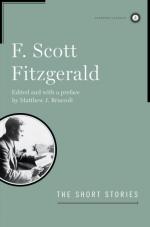|
This section contains 2,772 words (approx. 10 pages at 300 words per page) |

|
SOURCE: Mangum, Bryant. “Fitzgerald and Literary Economics.” In A Fortune Yet: Money in the Art of F. Scott Fitzgerald's Short Stories, pp. 3-7. New York: Garland Publishing, Inc, 1991.
In the following essay, Mangum explores the relationship between Fitzgerald's novels and short stories and discusses the reputation of his short stories as inferior fiction written only for financial gain.
From the beginning critics have argued that Fitzgerald prostituted his talent by writing slick magazine fiction when he could have devoted his energy to the production of more novels. Consequently, his career is often viewed as a study in literary schizophrenia. In a 1935 review of Taps at Reveille, T. S. Matthews mirrored the contemporary critical opinion that Fitzgerald's short stories were weaker than his novels because they were written for popular audiences: “Scott Fitzgerald is supposed to be a case of split personality: Fitzgerald A is the serious writer; Fitzgerald...
|
This section contains 2,772 words (approx. 10 pages at 300 words per page) |

|


